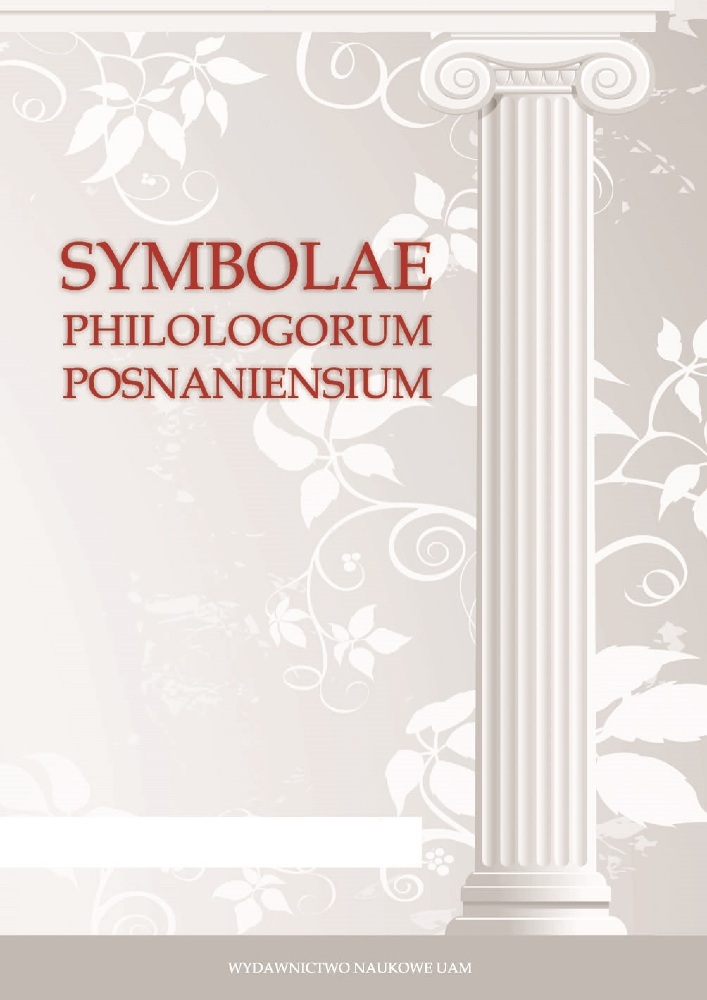Abstract
The present paper is devoted to Maximianus, and in particular to the motif of mala senectutis as developed by this late antique (6th cent. A.D.) Latin elegiac poet. After discussing some particularly informative passages, I focus on Maximianus’s interpretations and reinterpretations by Columbanus (543 – 615), Eugenius of Toledo († 657), and the anonymous author of the ninth century Imitatio Maximiani. I also point out his presence in vernacular medieval literature, namely English. Last but not least, I demonstrate how Maximianus’s image of an old man praying to Mother Earth inspired one of medieval scribes copying his text (in ms BJ 2141).References
Agozzino 1970: T. Agozzino, Massimiano. Elegie, a cura di..., Bologna 1970.
Alberto 1999: P.F. Alberto, Notes on Eugenius of Toledo, “The Classical Quarterly” 49 (1999), 769–785.
Allen, Roberts, Weinberg 2013: R. Allen, J Roberts & C. Weinberg (eds), Layamon’s Brut: Approaches and Explorations, Amsterdam 2013.
Brink 1971: C.O. Brink, Horace on Poetry: The Ars Poetica, Cambridge 1971.
Calboli Montefusco 2003: L. Calboli Montefusco (ed.), Papers on Rhetoric V. Atti del Convegno Internazionale “Dictamen, Poetria and Cicero: Coherence and Diversification” (Bologna, 10–11 maggio 2002), Roma 2003.
Coffman 1934: G.R. Coffman, Old Age from Horace to Chaucer. Some Literary Affinities and Adventures of an Idea, “Speculum” 11 (1934), 249–277.
Corradini 2010: R. Corradini et al. (eds), Ego Trouble: Authors and Their Identities in the Early Middle Ages, Wien 2010.
Cristante, Tessier 2004: L. Cristante, A. Tessier (eds), “Incontri triestini di filologia classica” 3 (2003–2004).
Díaz, Díaz De Bustamante 2005: M.C. Díaz, J.M. Díaz de Bustamante (eds), Poesia latina medieval (siglos V-XV): actas del IV Congreso del “Internationales Mittelateinerkomitee” (Santiago de Compostela 12–15 de septiembre de 2002), Firenze 2005.
Duncan 2005: T.G. Duncan, A Companion to the Middle English Lyric, Cambridge 2005.
Gillespie 2005: V. Gillespie, Moral and Penitential Lyrics, in: T. G. Duncan (ed.), A Companionto the Middle English Lyric, Cambridge 2005, 68–95.
Harrison 2013: M. L. Harrison, The Wisdom of Hindsight in “Layamon” and Some Contemporaries, in: Allen, Roberts, Weinberg 2013, 623–641.
Herren 2001: M.W. Herren, Some Quantitative Poems Attributed to Columbanus of Bobbio, in: Marenborn 2001, 99–112.
Huygens 1954: R.B.C. Huygens, Accessus ad Auctores, Collection Latomus 15, Bruxelles 1954.
Juster: A.M. Juster, Maximianus’ Elegies and the Appendix Maximiani: a translation and commentary (in progress).
Kowalczyk: M. Kowalczyk, description of the ms BJ 1954 (unpublished material). Leotta 1985: R. Leotta, Un anonimo imitatore di Massimiano, “Giornale Italiano di Filologia” 16(1985).
Manitius 1931: M. Manitius Geschichte der lateinischen Literatur des Mittelalters III, München 1931.
Marenborn 2001: J. Marenbon (ed.), Poetry and Philosophy in the Middle Ages, “Mittellateinische Studien & Texte” 29, Leiden 2001.
Mastandrea 2004: P. Mastandrea, Aratore, Partenio, Vigilio, coetanei (e amici?) di Massimiano elegiaco, in: L. Cristante, A. Tessier (eds), “Incontri triestini di filologia classica” 3(2004), 327–342.
Mastandrea 2005: P. Mastandrea, Per la cronologia di Massimiano elegiaco: elementi interni ed esterni al testo, in: Díaz, Díaz De Bustamante 2005, 151–179.
Nechutová, Radová 2006: J. Nechutová, I. Radová (eds), Laetae segetes. Griechische und Lateinische Studien an der Masaryk Universität und der Universität Wien, Brno 2006.
Nitecki 1981: A.K. Nitecki, The Convention of the Old Man’s Lament in the “Pardoner’s Tale”, “The Chaucer Review” 16 (1981), 76–84.
Orme 1973: N. Orme, English Schools in the Middle Ages, London 1973.
Paul 1862: J. Paul, Titan: a Romance, from the German of Jean Paul Friedrich Richter translated by Charles T. Brooks, vol. I, The Ten Persecutions, Fifth, Boston 1862.
Ratkowitsch 1986: Ch. Ratkowitsch, Maximianus amat. Zu Datierung und Interpretation des Elegikers Maximian, Wien 1986.
Rickert 1932: E. Rickert, Chaucer at School, “Modern Philology” 29.3 (1932), 257–274.
Sandquist Öberg 1999: Versus Maximiani: der Elegienzyklus textkritisch herausgegeben übersetzt und neu interpretiert von...., Stockholm 1999.
Schetter 1970: W. Schetter, Studien zur Überlieferung und Kritik des Elegikers Maximian, Wiesbaden 1970.
Schneider 2003: W.Ch. Schneider, Die elegischen Verse von Maximian: eine letze Widerrede gegen die neue christliche Zeit, Wiesbaden 2003.
Smolak 2006: K. Smolak, Crudelis aetas! (De carminibus quae Eugenius Toletanus in senectutem composuit), in: Nechutová, Radová 2006, 125–136.
Smolak 2010: K. Smolak: Omnia passus – die Leiden des Eugenius von Toledo. Zu den Gedichten 5, 13–19, 101 Alb., in: Corradini 2010, 79–87.
Spinazzė 2010–2011: L. Spinazzè, Per un’edizione critica digitale: il caso di Massimiano elegiaco, Università Ca’ Foscari Venezia. Dottorato di Ricerca in Italianistica e Filologia Classico-Medievale, A.A. 2010–2011 (available online at: http://hdl.handle.net/10579/1221 [16.05.2013]).
Spinazzė 2012: Maximianus, Elegiae, edizione digitale a cura di…, 2012 (available at: http://www.mqdq.it/mqdq/contesto.jsp?ordinata=pf1992488 [27.01.2013]).
Wasyl 2011: A.M. Wasyl, Genres Rediscovered. Studies in Latin Miniature Epic, Love Elegy, and Epigram of the Romano-Barbaric Age, Kraków 2011.
Wisłocki 1877–1881: W. Wisłocki, Katalog rękopisów Biblijoteki Uniwersytetu Jagiellońskiego, vols. I–II, Kraków 1877–1881.
Woods 2003: M. C. Woods, Using the Poetria nova to Teach Dictamen in Italy and Central Europe, in: Calboli Montefusco 2003, 261–279.
License
